Catching up with Franca Bianconi
November 2, 2017
By Reut Golinsky
Photo © Reut Golinsky, Polymnia, Ksenia Nurtdinova
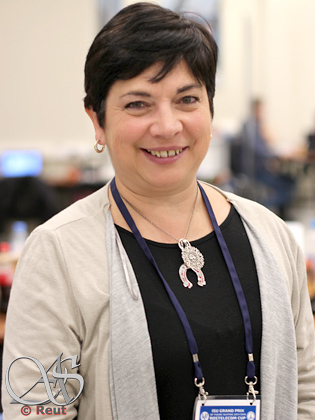 Italian figure skating coach and former Olympian Franca Bianconi has brought Italian pairs to significant heights. Her former students Stefania Berton and Ondřej Hotárek have achieved the highest Italian results in pairs - 2013 European bronze and three Grand Prix medals, including gold at Skate Canada 2013. This season she is as busy as ever preparing her students to fight for the Olympic berths and also to be fully ready for the World championships at home, in Milan.
Italian figure skating coach and former Olympian Franca Bianconi has brought Italian pairs to significant heights. Her former students Stefania Berton and Ondřej Hotárek have achieved the highest Italian results in pairs - 2013 European bronze and three Grand Prix medals, including gold at Skate Canada 2013. This season she is as busy as ever preparing her students to fight for the Olympic berths and also to be fully ready for the World championships at home, in Milan.
I want to ask you about a few of your students. I know that you have many, but recently a few of them became quite noticeable at international level. And I'm talking not only about Valentina and Ondřej, but also about Roberta Rodeghiero who has been memorable for the last few seasons. And about Matteo Rizzo who surprised us all during the last few weeks.
So let's start with Matteo. When did you start working together?
Actually I've been coaching Matteo since he started skating, since he was only six years old. And now he is eighteen. It's really nice when you raise a skater and you get to the point where he can really express himself and have good results. It's really rewarding for a coach. His parents, Valter Rizzo and Brunilde Bianchi, are skating coaches too. They were a very good international ice dance couple and afterwards they started teaching ice dance with good results. So they understand everything about skating, about sacrifices which are required, and they are really helping Matteo to follow his dream. He is a smart person - he knows what he wants and step by step he is trying to achieve it. This year he was able to do his best. Last year he had an accident, at the end of the summer, so he had to stop skating for about four months and that probably ruined the whole season. But this year he did well in summer, and so far he keeps on.
So for you it wasn't such a big surprise that he did so well at the beginning of the season and among other things, he succeeded in the Nebelhorn Trophy to qualify Italy for the Olympic Games...?
We're going step by step. First of all he had to qualify to go to the Nebelhorn. We have three top Italian boys, and our federation decided that the skater who skated the best at Lombardia Trophy would go. So, this was the first goal, and he skated really well. Then we said: "OK, let's turn the page and go to the Nebelhorn." We checked the names [in the roster] and we both thought: "OK, if he skates very well, he can make it." 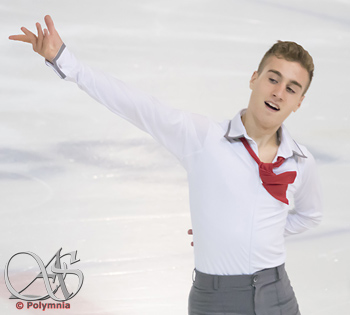 And he did! He has this great quality - he does well under pressure, he can really pull himself together and skate well. So that was the main success. He still had an appointment for the junior Grand Prix, but it was very close, just one week apart. But we discussed this and he said: "I want to go!" He started his first junior Grand Prix event well; he was second after the short, but then he completely blew the long. So I asked him: "Maybe you are tired? Maybe we should stop here?" And he said: "No! I'm not tired, I want to keep going, because I know what I did wrong in this long program. I want to do it better next time." And the next one was also only one week later. So we went to three competitions in a row and he was fantastic in the last one! And also it was at home, in Italy! It was the first time ever that Italy won a junior men's Grand Prix . So we were very, very happy!
And he did! He has this great quality - he does well under pressure, he can really pull himself together and skate well. So that was the main success. He still had an appointment for the junior Grand Prix, but it was very close, just one week apart. But we discussed this and he said: "I want to go!" He started his first junior Grand Prix event well; he was second after the short, but then he completely blew the long. So I asked him: "Maybe you are tired? Maybe we should stop here?" And he said: "No! I'm not tired, I want to keep going, because I know what I did wrong in this long program. I want to do it better next time." And the next one was also only one week later. So we went to three competitions in a row and he was fantastic in the last one! And also it was at home, in Italy! It was the first time ever that Italy won a junior men's Grand Prix . So we were very, very happy!
How and when will the decision about the Olympic Games be made?
We have certain rules: you have to make a sum of three international competitions plus the points at the Nationals. This rule determines the national ranking and based on this ranking our technical committee will decide who goes to next competitions - Europeans, Olympics, and Worlds.
So even if the Nationals - hopefully not! - go less well for him, Matteo still has a good "cushion" of points from his recent competitions, right?
Yes, based on his international competitions he is now very much ahead of others, because he earned around 230 points in three competitions, so it's pretty good. I know that our technical committee is very happy with his results; our federation is going to give him their full support. So I really hope he can make it.
That's exciting, especially because Italy should be at the team event too, so he might get a chance to skate more on the Olympic ice, and at such a young age!
He is young and he is possibly one of those who can skate at two or three Olympics, because he is so young still. But what we do, we go step by step, so now the main goal is Nationals and he will focus on that. And then if everything is OK we will focus on the next goal.
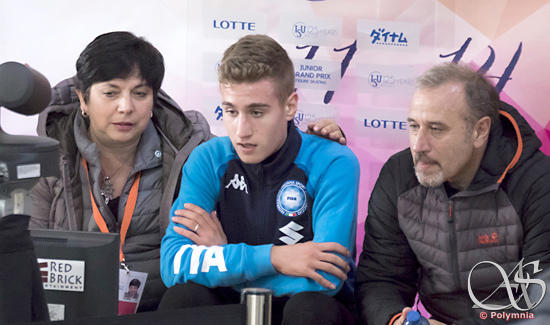
You were at the Olympic Games as a skater and as a coach. Based on this experience, how do you plan to guide your students this season towards them? Will you say: "Think about this as just another competition"? Or maybe you will advise: "Use this unique chance and use this pressure"? Or maybe a whole different approach?
It's nonsense to say that this is just like another competition, because it's not. It's a dream of every athlete; it's a goal of every athlete, so of course when you get there you are more nervous. The pressure is bigger, the media attention is bigger, and everything is bigger. So what I keep telling them is that they have to train in a way that they are able to manage this pressure. Every time you have a problem in practice or you don't feel so good, you have to fight against it, because you will not feel like you're having a vacation at the Olympics, right? It will be a hard challenge, so you have to train for this. You have to prepare your body, your mind, your attitude to get into a difficult situation and still perform your best. And some skaters - these skaters I coach they do it pretty much - when they have this pressure then can use it to perform even better. This is what I'm expecting from them.
Let's move to your other student, Roberta Rodeghiero. We haven't seen her this season yet...
Yes, Roberta is having health problems. It's a pity because she was really good, and she was also getting better and better. And all of a sudden she started feeling not well, and they just can't find a solution to this problem. We have been working a lot with doctors to try to solve this and so far it hasn't worked. They say that probably in ten to twelve months it will be better; the problem is we don't have this time. 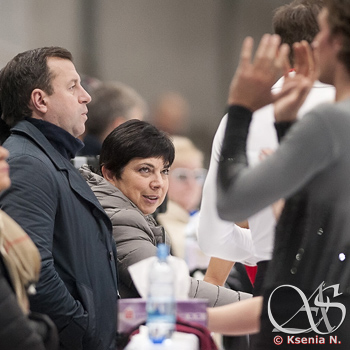 She has to try to compete at the end of November, maybe in Graz. And we will see.
She has to try to compete at the end of November, maybe in Graz. And we will see.
Italy has two spots for ladies at the Olympics, so it's Carolina and one more girl.
Yes and the rule is the same. All Italian girls have to compete internationally and gain the points. And we will see who will be the best. Of course, there are some exceptions that the federation can make. I'm sure that if Roberta is able to perform well, even if she didn't make the three competitions, she will be taken into consideration, because she did very well, she has a good World ranking, she has experience, and she is really the second best skater we have after Carolina. Hopefully she can recover and pull herself together for the Olympics.
What do you think about Carolina's decision to come back?
Well, she is brave. As she says she loves the sport, she loves the art; she loves to perform for the beauty of the sport. And I think it's good for our sport to have such an elegant skater. If she is happy about this, we're all happy. (smiles)
She is really a celebrity in Italy, so she probably brought a lot of attention to figure skating.
She is a well-known person in Italy, yes. So the media follows her a lot and it brings a lot of visibility to our sport.
Do you think it's something Italian skating needs? After she retires, who will take her place as a "face" of Italian figure skating?
I think in the last, let's say, twenty years, we were lucky because we had Fusar-Poli/Margaglio, then we had Olympics in Turin, then we had Carolina. So for twenty years, figure skating has been going around, which it was not before, absolutely not. When I was skating nobody knew what it was. And even in Turin I was commentating for "Rai" and many, many people still didn't know anything about skating. Now a lot of people know this sport, we have many more rinks. We were lucky to have those special talents that are born once every hundred years. And now we have to develop a good system to bring up all the good junior ones that we have, because we do have some good juniors. But they will need to gain more experience to compete at higher level. But this is possible only with a good system. I hope after the Olympic Games this will be started.
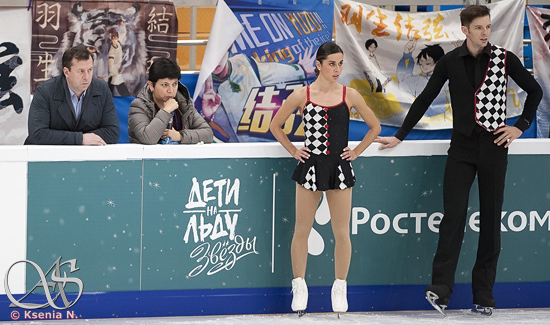
I know that you have many students and the "IceLab" is basically your rink. Which help do you personally feel that you need? Is this financial help?
Yes, a financial one.
And then you'll be able to invite more specialists, for example, from abroad?
More professionals, more money for the choreographers, more money to do seminars abroad. We are always very careful about how much money we spend. In our system, in the Western system, you have to pay for everything, you get nothing for free. So we pay for the ice, because it costs a lot to maintain an ice rink. And we pay the coaches. We also pay for the school. For example, Matteo, because of his schedule, was going to a private school. Now, when he goes to the university it will be a different story, but up until now he was going to a private school in order to be able to skate. And we need to pay for competitions except for the big ones. Just top skaters get good funding from the federation, but first you need to get there.
The Italian police force also helps some skaters, is that right?
Yes, when they are very, very good at international level, they can get into the army or police, and then they receive a salary. And it's the main thing which keeps our athletes going. But you can get this when you are Valentina and Ondřej. Matteo, for example, still doesn't have it. The ice dance team, Guignard/Fabbri, they just got in last year. So you see how high you have to get, it's not easy. Also they help all the sports, not only figure skating. So you have to be, let's say, top ten in the world.
So it's kind of a vicious cycle, to get funding you need to be top ten, but to get to the top, you need funding...
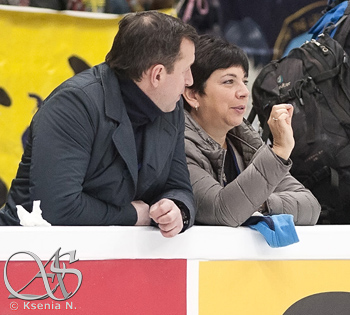 That's why I say that we need a system that has to become more professional. And I don't know who, maybe the federation, maybe someone else should try to find more sponsors. Now we get a lot of help with this new rink, we have practically everything we need - we have one and a half rinks-one is big and one is smaller but there is a project to make the second one bigger too; we have the ballet room, the gym and the room for media. But, of course, it was an investment and you have to be able to maintain it.
That's why I say that we need a system that has to become more professional. And I don't know who, maybe the federation, maybe someone else should try to find more sponsors. Now we get a lot of help with this new rink, we have practically everything we need - we have one and a half rinks-one is big and one is smaller but there is a project to make the second one bigger too; we have the ballet room, the gym and the room for media. But, of course, it was an investment and you have to be able to maintain it.
Was it created especially for your group?
Yes. A lady from a wealthy family in Italy, Mrs. Pesenti, had this idea of building a new ice rink. And she asked me what would be needed to produce good skaters. So I created a project, she liked it; she hired me and followed this plan.
And how much time did it take to build?
It was fast. Once she had all the permissions, she built it in six months. It was very, very fast.
So by getting more sponsors like this you can build a lot a rinks around Italy and rather fast.
I think if we find the right approach we can really produce something, because now we've acquired a lot of knowledge. We have good coaches, we have good choreographers, many of them are based all over the world, but they are still Italians. Like Massimo Scalli or Pasquale Camerlengo. Or Maurizio Margaglio who is in Finland. So there are a lot of good professionals around the world who are Italians and keep this connection with us.
The fact that you have Worlds this year in Italy, will it bring more visibility and attention?
I really hope so. Worlds are in Milan which is a very big city, it's really the city of fashion, of art, and it's an industrial city, a very busy city. So I hope we will have many, many spectators. And I hope television stations will show this event in the right way so this can be one of those things which can bring popularity to our sport, as we need this.
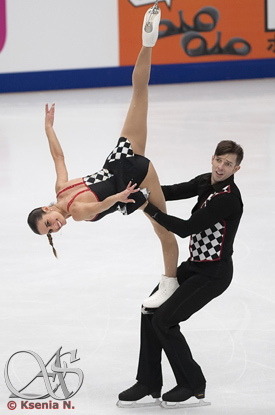 You will be there as a coach and as a commentator. Will you be involved in the organization of this event?
You will be there as a coach and as a commentator. Will you be involved in the organization of this event?
No, the organizing committee didn't contact me for this. But I'm very busy with my other roles.
Yes, actually one of the questions I wanted to ask after I read how many things you're involved with is when do you have time to sleep?
(laughs) When I come to these competitions and I have only one athlete then I get some time to sleep. Skating is my passion. And I'm really lucky to do what I love as a job. Not many people have this luck. So I really try to use it, to tell myself: "I'm so lucky I can do all the things I like to do, so if I do them 24 hours a day, it's still great."
Now let's get back to your students and talk about Valentina and Ondřej. And let's start from the very beginning. So you worked with Stefania and Ondřej, then they parted ways. And you also helped Valentina back then when she was still skating in singles. Was it your idea to create this new pair?
To tell the truth it was Vale. Well, actually both of them. We were in this summer camp in the Alps which we always do. Ondřa was there already with the idea of starting coaching, and Vale was there to train. But she didn't know if she wanted to go on or not because she understood that single skaters were going technically higher and higher, and she didn't feel she had the capability, she wasn't sure. All of a sudden they started to jump together, for fun. They did side by side jumps and she said: "Wow, I really like this!" And I said: "Yeah, this is the fun part..." And then, also for fun, they started to do some pair elements and she kept saying: "I like it! I want to do it! You know, Franca, I really want to try this!" And I said: "Vale, you're really crazy!" So I proposed this deal that they could try pair skating for one week and then we could decide. And Ondřa was also pushing this, he was also excited: "I want to try, I want to try! Give us, please, one week!" And after this week they were able to do the triple throw, the spirals, the side by side jumps, of course; two of the lifts were already going up...
Ondřa probably contributed a lot to the teaching process.
Ondřa was not really teaching, but he was guiding her: "You have to place this here, to do this and that." So this is how it all began and after this week Valentina made up her mind and I was also convinced that we could give it a try. 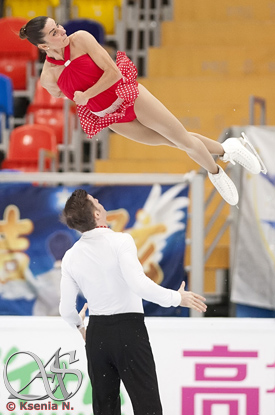 She is really brave, because to be up there was a new feeling for her. But she says she likes it.
She is really brave, because to be up there was a new feeling for her. But she says she likes it.
I feel that she is also happier now, as a skater and as a person. I feel different energy coming from her now.
Well, she always said to me that it's so much different - to skate in a pair, it's a totally different feeling. For certain reasons it's better, for certain reasons it's worse, but it's a different feeling. I think she feels more complete now, because she is one of the few that really have been in both situations. Yeah, she is happy; she is positive all the time and really wants to improve. I really like coaching them. Most of the time they are a happy team. They are really a good match, they really help each other, they are good friends, they get along on the ice and off the ice. Of course, there are some days which are less good, like with everybody.
If you choose to push forward with more complicated content, their direction would be jumps, I guess?
Yes, we're planning to put the side by side triple Lutz back. We will see if it will be at Europeans or at Olympics, but our goal is to get this back. We took it out because we wanted to pay more attention to the other pair elements. And I felt there was too much stress on this element, so there was not enough for the rest. But now the rest is getting much, much better, it's faster, more solid, so we can go back to the triple Lutz as this brings a lot of points, of course. Also, it's something different that not many pairs can do. But their main characteristic I think is the expression on the ice. They are really unique, they always find nice music which they can really feel, really express. This season they have two beautiful programs. They really like them because they go well with their personality. These are happy programs, programs where they can dance and can keep the audience with them.
This is what I actually wondered about, if all those interesting characters they chose for their programs in previous years, like their "Bond" program, for example, were their idea or yours.
It's collaboration. Usually when we get to April-May, everybody proposes ideas and then we go over them, decide "yes/no" for certain reasons. 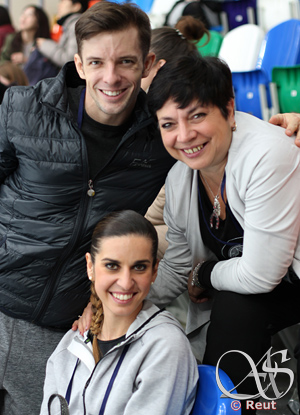 This year they really wanted to skate to this music for their short program - I was not so convinced at the beginning, but now I'm fully convinced. And we were totally on the track for the long program. First of all, in both cases it's Italian music, it's your home country and you want to represent it at the Olympics. Also, the Worlds are in Italy. And the music for the long program has also additional meaning because they started with Nino Rota in their first season. And now they want to show the closure of the four years with the same composer.
This year they really wanted to skate to this music for their short program - I was not so convinced at the beginning, but now I'm fully convinced. And we were totally on the track for the long program. First of all, in both cases it's Italian music, it's your home country and you want to represent it at the Olympics. Also, the Worlds are in Italy. And the music for the long program has also additional meaning because they started with Nino Rota in their first season. And now they want to show the closure of the four years with the same composer.
Is this the closure of this Olympic cycle only or...?
...career? They say they will decide at the end of the season. I will be always with them and I will be on their side. But this is their decision, it's their life. They have to decide if they want to move on to something different or if they want to stay. It's up to them.
But I hope they will skate more, because they've only had few years together.
Yes, it's only four years and for pairs it's not that long. For pairs to be very, very good I think you need eight years, because you need to find this mutual feeling. If you're able to stay in the same partnership for eight years, with such athletes you can really reach success.
And if they move on but want to stay in skating, will you welcome them to your coaching team?
Yes, for sure.



